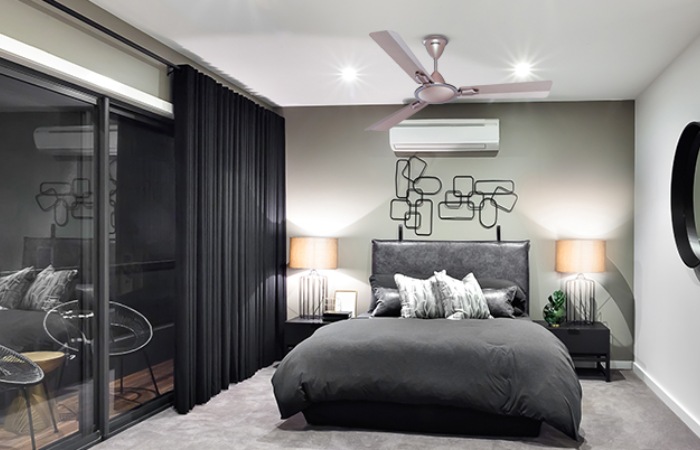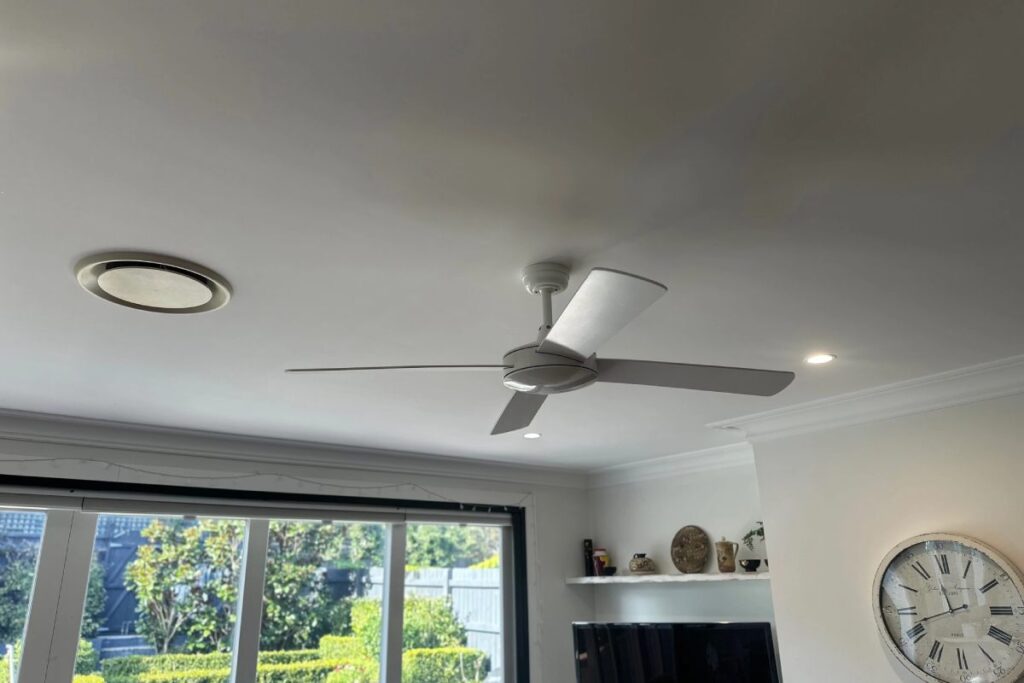Energy proficiency is a critical factor when it comes to cooling your home. Ceiling fans and air conditioners (ACs) are popular choices but vary significantly in energy consumption and cooling capacity. This article examines whether ceiling fans are more energy efficient than conditioners, helping you decide on your home and your budget.
How Do Ceiling Fans and Air Conditioners Work?

To compare their energy efficiency, it’s essential to understand how each cooling system works.
- Ceiling fans: Fans circulate air, creating a cooling effect that makes you feel cooler without lowering the room’s temperature. They are designed to improve comfort by improving airflow rather than cooling the air.
- Air conditioners: Air conditioners reduce the actual temperature of a room by removing heat and humidity. They use compressors and refrigerants to cool the air and maintain a set temperature, making them ideal for hot climates.
Energy Consumption: Ceiling Fans vs. Air Conditioners
Ceiling Fans: Minimal Energy Usage
Ceiling fans use much less electricity compared to conditioners. On average:
- A typical ceiling fan uses between 30 and 75 watts per hour.
- Electricity costs approximately $0.01 to $0.02 per hour, depending on your electricity rates and your choice of supplier, such as Royce City Electric Suppliers, who may offer competitive plans.
Air Conditioners: Higher Energy Demand
Air conditioners use much more energy. On average:
- A window air conditioner uses among 500 and 1,500 watts per hour.
- Central air conditioning systems can use between 3,000 and 5,000 watts per hour.
- Costs can be from $0.10 to $0.50 per hour, depending on the size and use of the unit.
Key information: Ceiling fans are 90% more energy efficient than air .
Cooling efficiency: What do you need?
Ceiling Fans: Ideal for Mild Temperatures
Fans are excellent for increasing comfort in moderately warm environments. However, they:
- Do not reduce room temperature.
- They are most effective when there are people in the room, as the cooling effect of the wind is felt directly on the skin.
Air Conditioners: Best for Intense Heat
Air conditioners are the best choice for extremely hot or humid climates. They:
- Provide continuous cooling, lowering the ambient temperature.
- Offer dehumidification that improves comfort in sticky conditions.
Cost Comparison
Initial Costs
- Ceiling fans: These are usually affordable and range from $50 to $300, including installation.
- Air conditioners: Higher upfront costs, with window units costing $150 to $500 and central systems costing $3,000 to $7,000 or more.
Maintenance Costs
- Fans require minimal maintenance, such as dusting and periodically lubricating the motor.
- Air conditioning units require frequent maintenance, including filter changes, refrigerant charges, and possible repairs.
Environmental Impact
Ceiling Fans
- Low energy consumption means a lesser carbon footprint.
- Fans are an eco-friendly option for people looking to reduce their energy consumption.
Air Conditioners
- Higher electricity consumption increases greenhouse gas emissions, especially if they run on fossil fuels.
- Modern models with high SEER (Seasonal Energy Efficiency Ratio) ratings and eco-friendly refrigerants can reduce their environmental impact.
When to Use Ceiling Fans and Air Conditioners Together
Combining ceiling fans with air can maximize efficiency. Here’s how:
- Set your air conditioner’s thermostat a few degrees higher and use ceiling fans to enhance the cooling effect. This reduces the load on the air conditioner and lowers energy costs.
- Turn off fans when no one is in the room to avoid wasting electricity, as fans cool people, not the space.
Which Option Is Best for You?
The answer depends on your climate, budget, and cooling needs:
Choose ceiling fans if:
- You live in a temperate climate.
- You prioritize energy efficiency and cost savings.
- You want a low-maintenance cooling option.
Choose air conditioners if:
- You live in a hot, humid region.
- Precise temperature control is critical.
- It would help if you cooled for long periods or large spaces.
Conclusion
While ceiling fans are certainly more energy-efficient than air , they serve different purposes. Fans provide affordable, environmentally friendly comfort, but they cannot replace the powerful cooling capabilities of air conditioners in extreme conditions. Consider combining both options to balance comfort, cost-effectiveness, and sustainability for the best results.
Investing in energy-efficient appliances like high-SEER air conditioners or Energy Star-rated ceiling fans can further optimize your cooling strategy.


